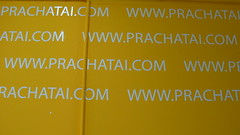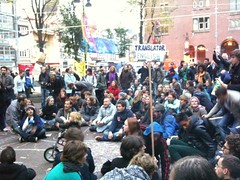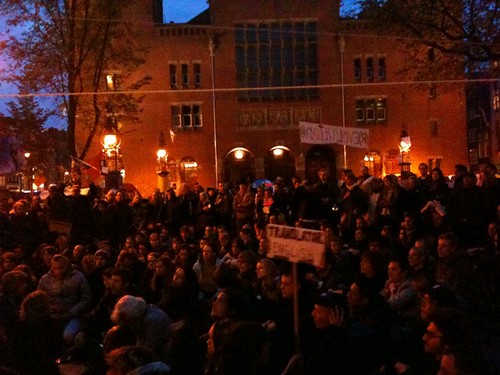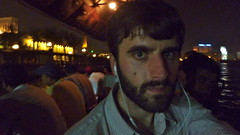 It was the summer of 2008 and I was in Bangkok, Thailand, on a then work related trip that left me enough spare time to look around and do some reporting. My focus included alternative media, and lucky for me, a good friend introduced me to Jiew, editor of the alternative magazine Prachatai.com. We did a very interesting and informative podcast about the situation in Thailand, which included a discussion of the limitations on press freedom in that country.
It was the summer of 2008 and I was in Bangkok, Thailand, on a then work related trip that left me enough spare time to look around and do some reporting. My focus included alternative media, and lucky for me, a good friend introduced me to Jiew, editor of the alternative magazine Prachatai.com. We did a very interesting and informative podcast about the situation in Thailand, which included a discussion of the limitations on press freedom in that country.
During the interview we touched upon the “Lèse Magesté”: extremely oppressive laws that govern how you can or cannot talk about the royal family. As a journalist, you are not allowed to criticize the royal family in publications. Doing so would constitute a serious offense and while I can’t remember what the average sentence could be, I remember it was bad. Jiew was extremely well versed in what a reporter or media channel could and couldn’t do in their work, even an alternative source. To my surprise she even asked me to turn off my recorder when we got to the part about the laws regarding media and the royal family. She explained off the record how it works and the risk that one ran by publishing anything considered critical the exalted king. It marked, still to this day, one of the few times in the 7 year history of my program, that I’ve had to turn off a recorder for legal reasons- even just to hear a seemingly harmless explanation of the rules.
Over the years Jiew and I have of course remained in contact, whenever there’s something (and there always is) going on in Thailand or SouthEast Asia, I know I can ask her for help with information or perhaps a good source to better understand what is happening.
Unfortunately, and to my great shock and disappointment, the Thai government is now pursuing a case against her. Claiming, I believe, a violation of the Royal Family criticism laws at her publication; they are seeking a jail sentence. As many watchdog groups have reported, the government is clearly afraid of someone so committed to reporting what is really going on behind the dog-n-pony show Thailand puts on for the tourist masses.
And so an excellent journalist, a friend of this citizenreporter.org, and someone who has dedicated her life to making the world around us a better place faces the looming threat of being convicted of a crime that should have long been stricken from the legal books in favor of real universal human rights. All the more reason for us to help Jiew beat this bogus charge in any way we can, so she can fight twice as hard next time to keep this from happening ever again.
(To be continued, trail posponed to February)
 Two minutes captured during a General Assembly meeting on Monday the 17th of October.
Two minutes captured during a General Assembly meeting on Monday the 17th of October.

